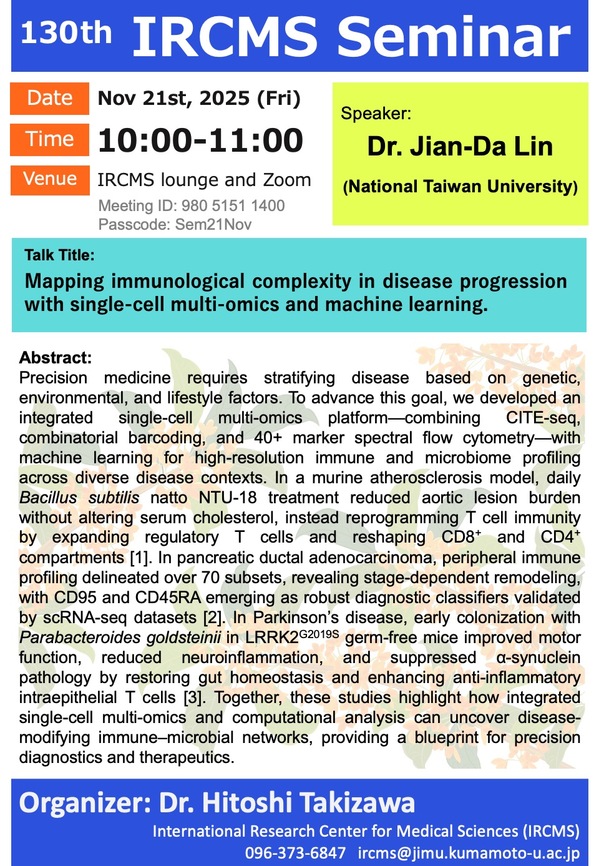- HOME
- News & Events
- [Nov. 21] 130th IRCMS Seminar
News & Events
[Nov. 21] 130th IRCMS Seminar
October 28 2025
We would like to inform you that the 130th IRCMS seminar has been scheduled as below.
* This IRCMS seminar is open to everyone.
Date : November 21, 2025 (Friday)
Time : 10:00-11:00
ZOOM : Meeting ID: 980 5151 1400
Passcode: Sem21Nov
Speaker : Jian-Da Lin (Department of Biochemical Science and Technology, National Taiwan University)
Title : Mapping immunological complexity in disease progression with single-cell multi-omics and machine learning.
Abstract:
Precision medicine requires stratifying disease based on genetic, environmental, and lifestyle factors. To advance this goal, we developed an integrated single-cell multi-omics platform--combining CITE-seq, combinatorial barcoding, and 40+ marker spectral flow cytometry--with machine learning for high-resolution immune and microbiome profiling across diverse disease contexts. In a murine atherosclerosis model, daily Bacillus subtilis natto NTU-18 treatment reduced aortic lesion burden without altering serum cholesterol, instead reprogramming T cell immunity by expanding regulatory T cells and reshaping CD8⁺ and CD4⁺ compartments [1]. In pancreatic ductal adenocarcinoma, peripheral immune profiling delineated over 70 subsets, revealing stage-dependent remodeling, with CD95 and CD45RA emerging as robust diagnostic classifiers validated by scRNA-seq datasets [2]. In Parkinson's disease, early colonization with Parabacteroides goldsteinii in LRRK2G2019S germ-free mice improved motor function, reduced neuroinflammation, and suppressed α-synuclein pathology by restoring gut homeostasis and enhancing anti-inflammatory intraepithelial T cells [3]. Together, these studies highlight how integrated single-cell multi-omics and computational analysis can uncover disease-modifying immune-microbial networks, providing a blueprint for precision diagnostics and therapeutics.
Major papers:
1. Bacillus subtilis natto NTU-18 attenuates atherosclerosis progression by modulating peripheral immune cell alterations. Applied Microbiology and Biotechnology (In Press).
2. Peripheral immune landscape in pancreatic ductal adenocarcinoma reveals expansion of effector states with disease progression. (Under Revision)
3. Parabacteroides goldsteinii mitigates Parkinsonism in LRRK2 mutant mice by reducing neuroinflammation through gut-brain axis. (Under Revision)
Flyer: (Click to enlarge)

